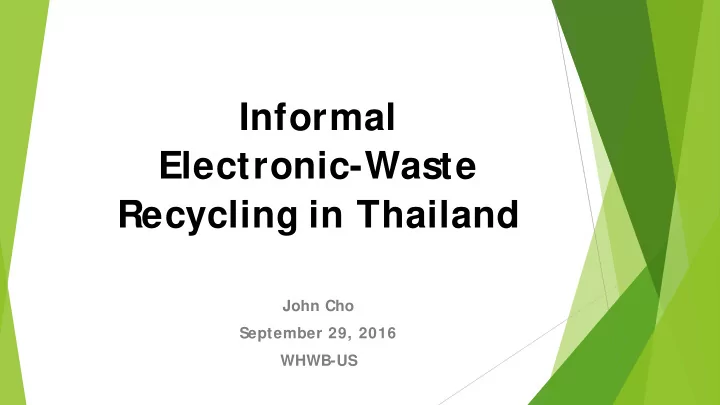

Informal Electronic-Waste Recycling in Thailand John Cho September 29, 2016 WHWB-US
Overview ▶ E-waste = discarded consumer electronics and industrial electrical equipment ▶ 3 main categories = large household appliances (refrigerators), information technology (computers), and consumer equipment (TVs, cell phones) ▶ Production of EEE (electrical and electronic equipment) ▶ 8% of all municipal waste and growing ▶ A global, interregional, and domestic problem ▶ 75-80% of e-waste shipped to countries in Asia and Africa for ” recycling” and disposal ▶ 70% of e-waste unreported or unknown ▶ Loopholes in current e-waste regulations send e-waste to developing countries
Associated Hazards and Issues ▶ Heavy metals Pb, Zn, Cu, Cr, Hg, S n, etc. ▶ ▶ Aromatic/ less-well known compounds ▶ Polycyclic aromatic hydrocarbons (PAHs) ▶ Dioxins, furans ▶ Brominated flame retardants (BFRs) ▶ Polybrominated biphenyls, diphenylethers (PBBs, PBDEs) ▶ Routes of Exposure ▶ Inhalation of particulates, VOCs ▶ Direct dermal contact ▶ Ingestion of contaminated dust/ food Environmental Contamination ▶ ▶ Take-home Exposure
Kalasin, Thailand ▶ A rural province in NE Thailand ▶ Informal e-waste recycling site previously studied by researchers at Mae Fah Luang University ▶ Workers conduct burning of e-waste at a central site ▶ Most e-waste dismantling and recycling is conducted at the individual worker’ s home ▶ Doctors at the local health clinic reported elevated blood lead levels in the e-waste workers ▶ Goal: Characterize exposures, various routes of exposure (inhalation, dermal, etc.), electronic- waste recycling methods and processes, and general health status among the community
Methods/Data Collection ▶ Questionnaires ▶ Blood/ Urine S amples ▶ Personal Air S amples ▶ Environmental S amples (Air, S oil, Rice) ▶ Noise ▶ Medical Data (Blood Pressure, S pirometry, Audiometry, Heart Rate)
Preliminary Findings/Future Plans ▶ We are waiting for the results of the samples’ analyses to come back from various labs ▶ Personal and environmental air samples show seemingly low airborne exposures, while wipe samples show potential exposure through food. S tatistical analyses will be performed on all ▶ the data. ▶ Results will be reported to the participants and community members involved in electronic-waste recycling by the Thai professors involved in the study ▶ Post-analyses, the main goal is to improve their occupational environment and work practices to that they can continue their livelihood in a safe manner.
Funding ▶ Graham S ustainability Institute ▶ Rackham Graduate S chool ▶ Rackham International Research Award ▶ Rackham S ummer Research Award ▶ Rackham Graduate S tudent Research Grant ▶ Center for the Education of Women ▶ Menakka and Essel Bailey Fellowship ▶ Center for S outheast Asian S tudies ▶ Thai S tudies Grant
Thank You!
Recommend
More recommend